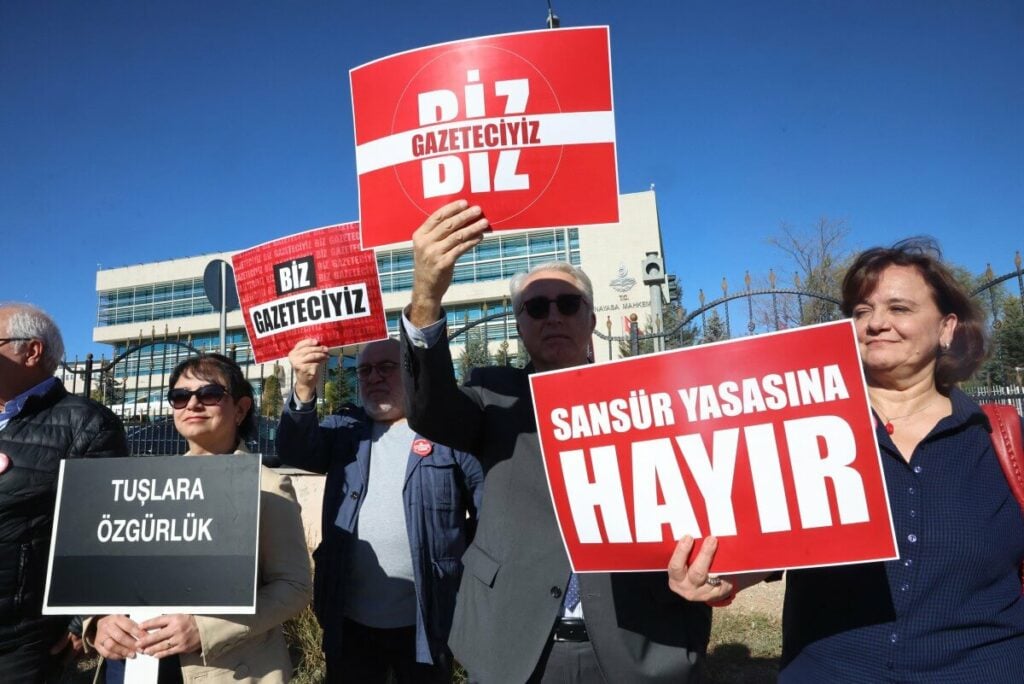In a move that led to disappointment and anger among journalists, Turkey’s top court has refused to annul a controversial media law which press groups say is used to silence journalists on the pretext of halting the spread of disinformation, the T24 news website reported.
The Constitutional Court decided with a majority of votes on Tuesday not to annul the law. The main opposition Republican People’s Party (CHP) challenged the law at the court demanding the annulment of Article 29, which amends the Turkish Penal Code (TCK) by adding a provision — Article 217/A — that would subject persons found guilty of publicly disseminating “false or misleading information” to between one and three years in prison and would increase by half the penalty for offenders who hide their identity or act on behalf of an organization.
The new legislation went into effect in October 2022 and consists of 40 articles amending several laws, including the Internet Law, the Press Law and the TCK.
Dozens of journalists gathered in front of the top court in Ankara on Wednesday and began keeping watch as the court started reviewing the controversial law.
The journalists, holding placards, asked the court annul the law, known as the “disinformation law.” They decided to continue their watch until the top court made its decision following a call from press organizations.
“We are journalists” and “No to the censorship law” read the placards carried by the journalists.
Since it went into effect in October 2022, the law has been used to investigate 33 journalists, the last one being T24 news website journalist Tolga Şardan.
Şardan was placed in pre-trial detention on Nov. 1 under the “disinformation law,” due to one of his articles in which he talked about alleged corruption within the Turkish judiciary. He was released from pre-trial detention on Tuesday in the wake of outrage from local and international rights and press advocacy groups.
Şardan was also among the journalists awaiting the top court’s decision on the “disinformation law” on Wednesday. Before the court announced its ruling, he told reporters he was expecting the court to annul the law.
Turkish Journalists’ Association Secretary General Kenan Şener said the journalists would remain in front of the court until it made its ruling on the annulment of the law.
Reporters Without Borders (RSF) Turkey representative Erol Önderoğlu said the top court’s failure to annul the “disinformation law,” which had led to “great damage” to journalism over the past year, has opened up to debate the independence of the court.
“The Constitutional Court has left journalists to their fate,” he said.
Turkey, where the judiciary is criticized for being under the control of the government, was ranked 117th among 142 countries in the rule of law index published by the World Justice Project (WJP) last month.
Meanwhile, CHP leader Özgür Özel, who was elected to party leadership on Sunday, joined the protesting journalists in front of the top court before it announced its decision. Özel described the law as a “censorship law” and said if the Constitutional Court does not annul it, many more journalists will go to jail like Şardan. He said if the law was really aimed at fighting disinformation, Turkey would not be one of the biggest “havens of disinformation” in the world today.
The law, which was passed in October 2022 and signed by President Recep Tayyip Erdoğan, has drawn widespread criticism from rights groups and the opposition for further restricting freedom of expression in Turkey.
According to RSF, 90 percent of the national media in Turkey, which was ranked 165th among 180 countries in the RSF’s 2023 World Press Freedom Index, is owned by pro-government businessmen and toe the official line.

